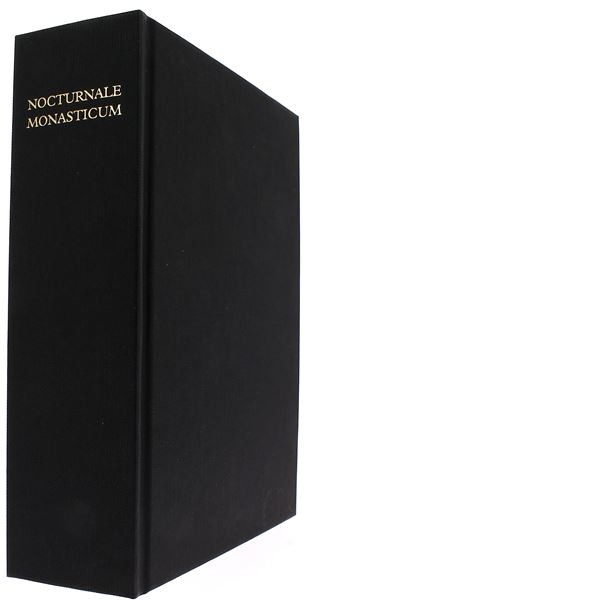The notes below are a guide to the Benedictine Office in its traditional form, form January 2023.
While the notes generally follow the 1962 calendar and rubrics, some notes on pre-1962 practices have been included both because some of the reforms (such as the abolition of the Octave Days of the sanctoral feasts of the Christmas Octave and the Octave of Epiphany) represent major divergences from tradition, create new problems for the calendar, and because a number of monasteries have revived them.
JANUARY 2023
Sunday
1 January – Octave Day of the Nativity (Circumcision of the Lord), Class I
MD 108*/AM
271 ff.
Monday 2 January – Class IV [EF/In some places: Most Holy Name of Jesus, Class II; Previously:
with a commemoration of the Octave of St Stephen); **in some places: St Thomas
of Canterbury, Class II]
MD 119*/AM 273 ff.
Tuesday 3 January – Class IV [Previously: Octave
Day of St John]
Ordinary of
the Nativity, MD 119*/AM 273 ff.
Wednesday 4
January – Class
IV; St Titus, Memorial [USA/Gower: St Elizabeth Anne Seton,
Class III; Previously: Octave Day of Holy Innocents]
for
the commemoration at Lauds, MD 125-6*/AM 285.
Thursday 5
January – Class IV [EF: St Telesphorus, Memorial; USA/Gower: St John Neumann,
Class III; Previously: Vigil of the Epiphany]
1 Vespers of the Epiphany,
MD 126*/AM 287 ff.
Friday 6 January – Epiphany of Our Lord, Class I
[Previously: with a Privileged Octave of the second order]
MD 129*/AM
290 ff.
Saturday 7 January – Class
IV; Saturday of Our Lady [Tasmanian Benedictines: Our Lady of Cana, Class I
(Patronal feast); Canada: St André
Bessette, Class III]
Matins to None:
Office of Our Lady after Christmas; I Vespers of
the First Sunday after the Epiphany,
MD 140*/AM 301 ff.
Sunday
8 January – First Sunday after Epiphany/Sunday within the Octave of the
Epiphany, Class II [EF: Holy Family, Class I]
MD 142*/AM 302 ff.
Monday 9 January –
Class IV
Ordinary of Epiphanytide, collect of the Epiphany, MD 133*/AM 292 ff; Benedictus
antiphon for Day II (in the former Octave), MD 135*/AM 298; collect (of the
First Sunday after Epiphany), MD 144*/AM 302.
Tuesday 10 January – Class
IV; St Paul the First Hermit, Memorial [Benedictine Confederation: St. Gregory
of Nyssa, Optional Memorial]
Canticle
antiphons at Lauds and Vespers for Day III.
Wednesday 11 January –
Class IV [EF: St Hyginus, Memorial]
Canticle antiphons of Day
IV.
Thursday 12 January –
Class IV [**In some places: St Benedict Biscop, Class III; Canada: St Marguerite
Bourgeoys, Class III]
Canticle antiphons of
Day V.
Friday 13 January –
Commemoration of Our Lord’s Baptism (Octave Day of the Epiphany), Class II
MD 129*/AM
290 ff.
START OF TIME
THROUGHOUT THE YEAR
Saturday 14 January – Class IV; Saturday of Our Lady; SS Hilary [EF: Class III] and Felix, Memorials
Office of Our Lady
after Christmas, MD (133-4)/AM 717-8; for the commemorations at Lauds, MD
[24-5]/AM 775; I Vespers of the Second Sunday after Epiphany: MD 146*/AM
306 ff.
Sunday
15 January – Second Sunday after Epiphany, Class II [**In some places, Our Lady
of Prompt Succor, Class I; Previously: St Maurus]
MD
146-7*/AM 306.
Monday 16 January – Class IV; St Marcellus I, Memorial
[EF: Class III]
Collect, MD 147*/AM
306; for the commemoration at Lauds, MD [25]/AM 783.
Tuesday 17 January – St Antony, Class III
MD (78)/AM 672 ff; collect of the
feast, MD [26]/AM 783.
Wednesday 18 January – Class IV [EF: St Prisca,
Memorial; start of Church Unity Octave; In some places, St Peter's Chair]
Thursday 19 January – Class IV; SS Marius,
Martha, Audifax and Abachum, Memorial
for the commemoration at Lauds, MD [26]/AM 784.
Friday 20 January – SS
Fabian and Sebastian, Class III
MD [27]/AM 784.
Saturday 21 January – St Agnes, Class III (Class II for
monasteries of nuns) [**In some places, St Meinrad, Class I]
Matins to
None: of the
feast, MD [27]/AM 786 ff; 1 Vespers of Third
Sunday after Epiphany, MD 147-8*/AM 307 OR IF
Class II, 2 Vespers of the feast with a commemoration of the Sunday.
Sunday
22 January – Third
Sunday after Epiphany, Class II
MD
148-9*/AM 307.
Monday 23 January – Class IV; St
Emerentiana, Memorial [EF: St Raymond Pennafort, Class III]
for the commemoration
at Lauds, MD [35]/AM 790.
Tuesday 24 January –
Class IV; St Timothy, Memorial
for the commemoration
at Lauds, MD [35–6]/AM 790.
Wednesday 25 January – Conversion of St Paul, Class III
MD [36]/AM
792 ff.
Thursday 26 January – Class IV; St Polycarp, Memorial [EF:
Class III; Benedictine Confederation: St Robert, SS Alberic and Stephen,
Optional Memorial; Australia Day]
for the commemoration
at Lauds, MD [42-3]/AM 797.
Friday 27 January – St
John Chrysostom, Class III
MD [43]/AM 797.
Prime: Antiphon 1 of Lauds of the Common,
MD (64)/AM 657.
Saturday 28 January –
Class IV; Our Lady on Saturday; St Cyril of Alexandria, Memorial [EF: St Peter Nolasco, Class III; St Agnes]
I Vespers of the Fourth Sunday after Epiphany,
MD 149-50*/AM 308.
Sunday
29 January – Fourth Sunday after Epiphany, Class II
MD
149-50*/AM 308.
Monday 30 January – Class IV [EF: St Martina, Class III]
Tuesday 31 January – Class IV; St John Bosco, Memorial
[Gower: SS John Bosco, Peter Nolasco and Raymond Pennafort, Memorials; EF:
Class III]
for the commemoration at Lauds, MD [45-6]/SupAnt 35.
